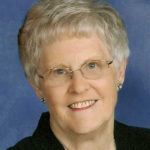
One priest and two deacons have just been ordained for the Diocese of Davenport, a cause for celebration and a reminder that the harvest is abundant but the laborers are few. As Father Jake Greiner, director of seminarians said at ordination Masses on June 5 and 12, all Catholics have a responsibility to pray, invite and encourage people to “listen to God’s call in their lives.”
Father Greiner said these actions would end the “vocation crisis” but perhaps we need to reframe that term, putting the focus on creating a culture of vocations in our parishes. Whatever term we use, change is necessary.
Dan Ebener, diocesan director of Parish Planning, reported last fall at the Parish Corporate Board meetings that by July 1 of this year, 12 of the current 55 active diocesan priests will be 70 years or older, the age at which a priest may retire. Some priests continue in active ministry for a few more years after they reach the age of 70. By 2030, 33 of the 55 priests active today will be 70 years or older. Just 22 of the active priests today (40%) will be under the age of 70 a decade from now.
With the merger of parishes in the Highway 22 corridor, our diocese will have 74 parishes as of July 1. Granted, men will be ordained to the priesthood over the next 10 years, but not at a pace to keep up with retirements from active ministry.
The ordinations of three young men — Father Rauenbuehler on June 5 and Deacons Dale Mallory and Ben Snyder on June 12 — reflect the hope that flows from faith. The Holy Spirit calls us to convey our hope through words and action to keep the church alive and relevant in a world in need of the salvific message of Jesus Christ.
Our role is clear. We create a culture of vocations by taking proactive steps to boost participation in parishes and inspire vocations to the priesthood, diaconate, religious life, marriage and single life. We need to empower the laity in the life of the church and make good use of the diaconate, in addition to promoting vocations to the priesthood.
Parishioners need to let go of the “we’ve always done it this way” attitude. All of us need to be faithful missionary disciples in whatever way we feel called. Our active, conscious participation in vibrant liturgies will inspire us to go out beyond the church walls to serve and foster relationships with others. We need to be willing to risk rejection, just as Jesus did.
We begin, as always, with prayer — personal and communal. Prayer for vocations should be a priority in parishes and in homes. Download the prayer for vocations from the diocesan website (davenportdiocese.org/vocations) and place it on the dining room table in your home. Evangelization teams that parishes formed for the Vision 20/20 process could begin praying for vocations, an idea that resonates with Bishop Thomas Zinkula.
“Everybody can pray. It’s needed, it’s easy and literally everyone can do it,” says Father Ross Epping, diocesan director of vocations. “Prayer, personal and communal, because we need both to balance our hearts and to help us discover the urgings of the Holy Spirit.” Prayer groups, Bible studies and other small-group faith communities are just a few ways to engage in communal prayer.
Pastors and parish councils are another crucial element in promoting vocations, as influencers of the people they serve and represent. Pastors need to be intentional in talking about vocations, the priesthood or discipleship in their homilies. Parish councils need to lead by example, praying for vocations and encouraging their fellow parishioners to do so.
Host a holy hour for vocations. Invite seminarians to share their stories in person, via video conference or in a letter in the parish bulletin. Visit the diocesan vocations page at davenportvocations.org. Make a reservation for the St. Serra Club Mass and meeting to support vocations, scheduled June 23 (Contact Colleen Darland at 563-888-4378 or vocations@davenportdiocese.org by June 21).
“We need to be Christ in the world, delving into the lived experiences of the body of Christ,” Father Epping says. That social outreach inspired by our participation in the Eucharist will create a culture of vocations that encourages the faithful to become good priests, deacons, women and men religious, spouses or single persons who have discerned their authentic calling. Another essential element — parishes that convey a sense of community, consciously rooted in Jesus Christ.
Barb Arland-Fye, Editor
arland-fye@davenportdiocese.org











